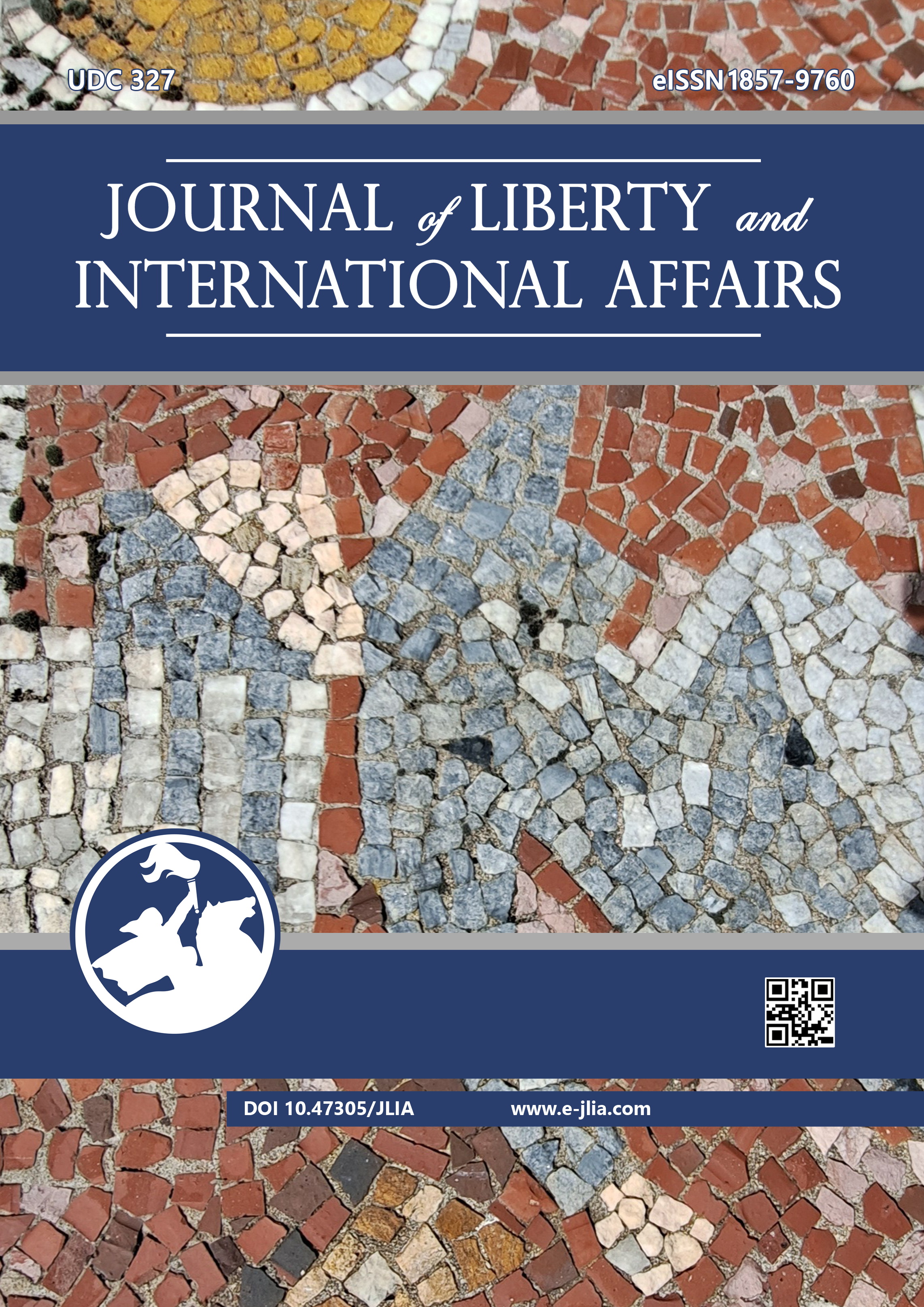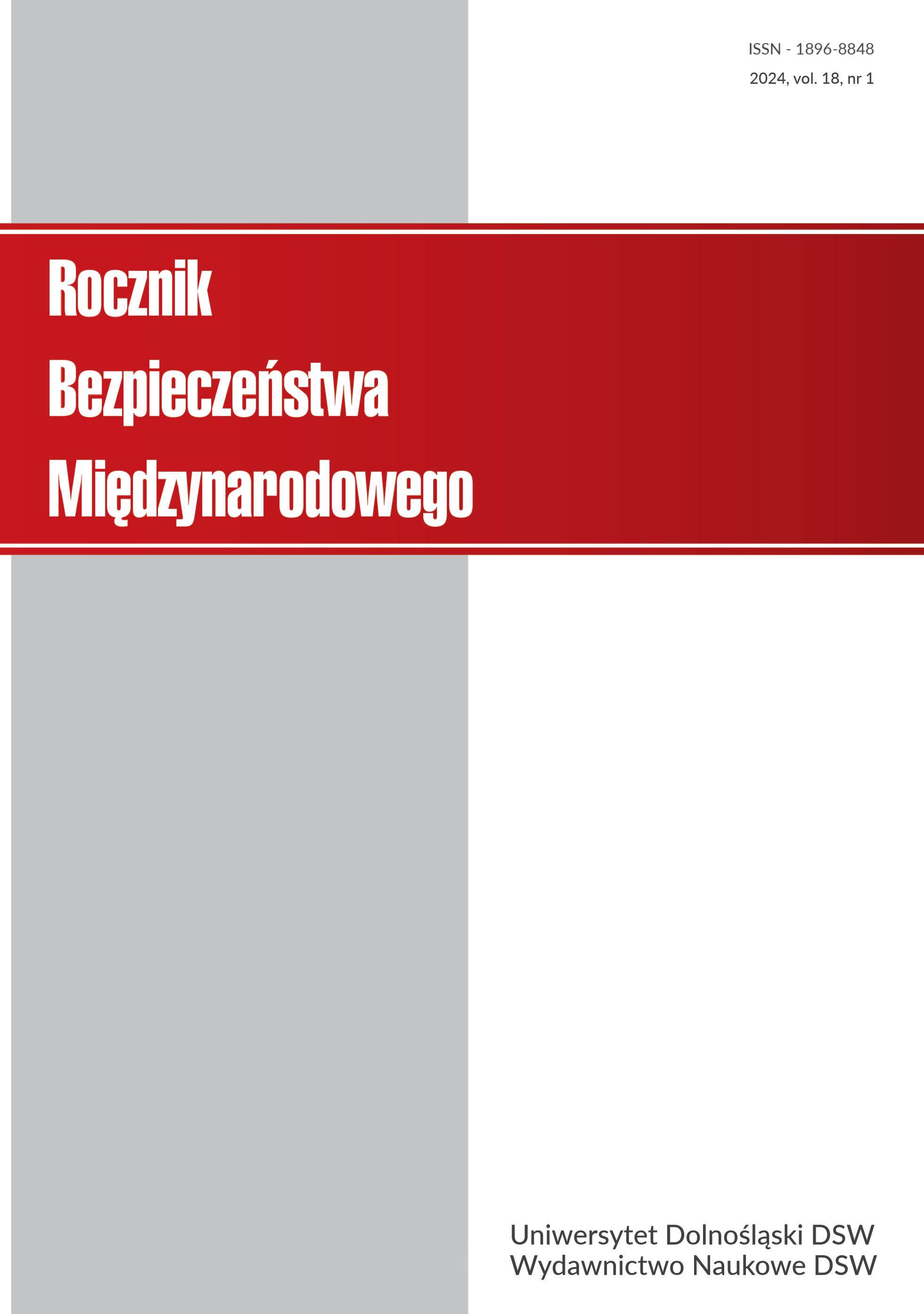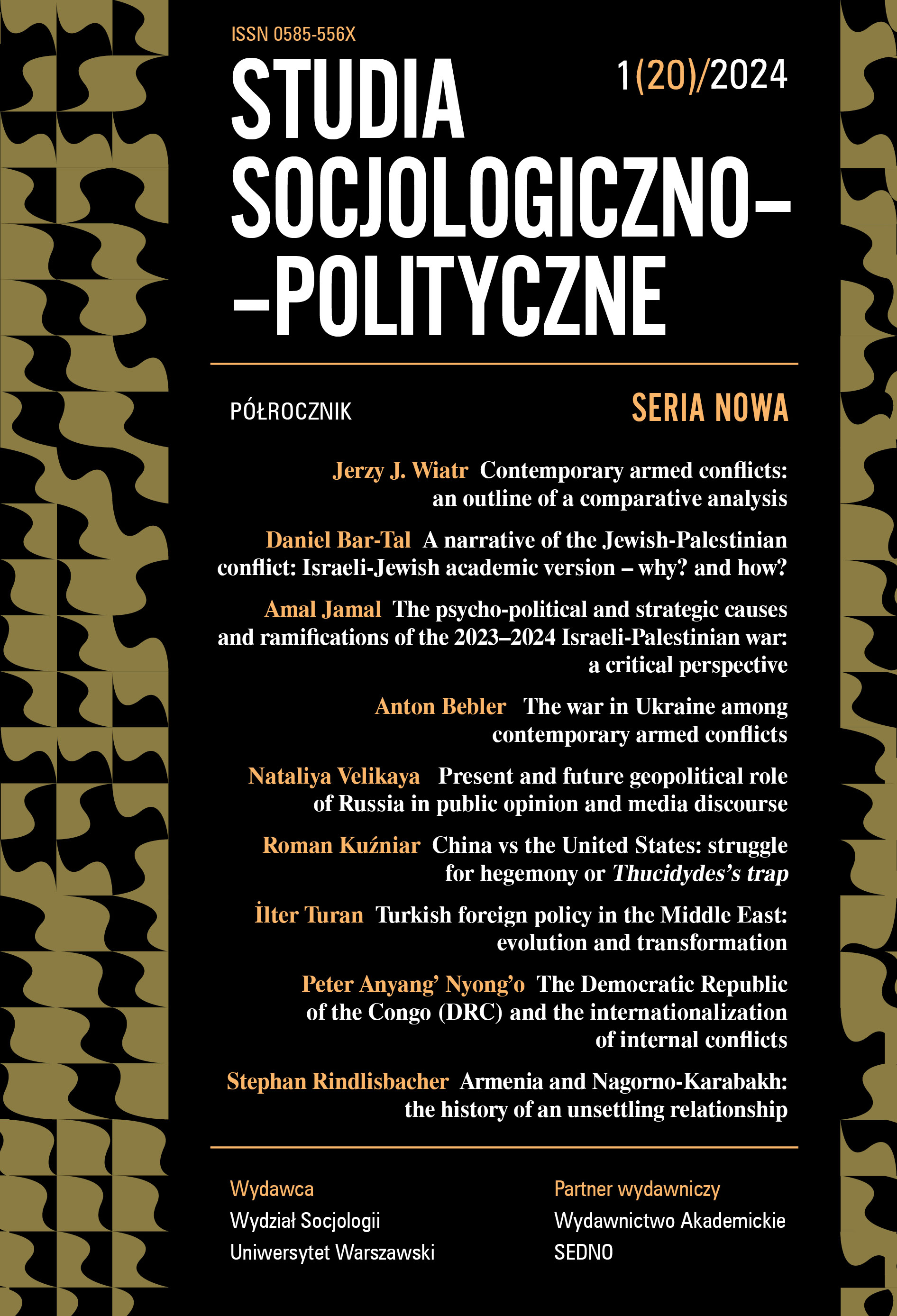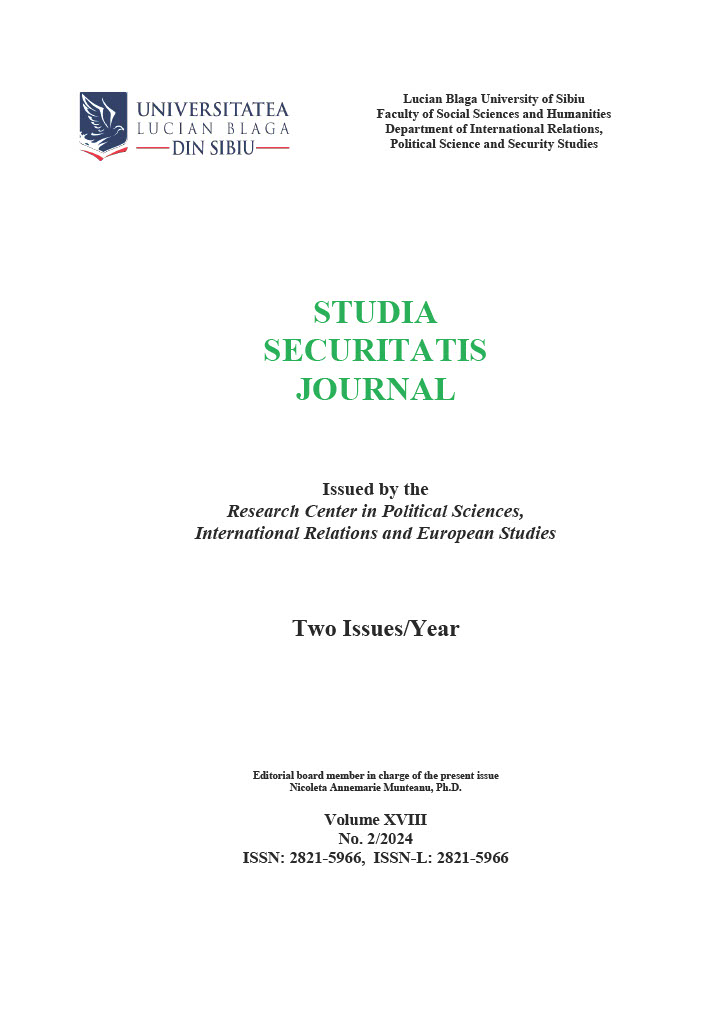
We kindly inform you that, as long as the subject affiliation of our 300.000+ articles is in progress, you might get unsufficient or no results on your third level or second level search. In this case, please broaden your search criteria.


The article analyzes the process of normalizing relations between Belgrade and Pristina after adopting the Agreement on the Path to Normalization. The analytical framework of neorealism was used to explain that the normalization process was accelerated due to the war crisis in Eastern Europe. The international legal aspects of the agreement were scrutinized, based on the method of content analysis and comparative studies, to argue that the agreement is a legally binding treaty between two sides that respect each other’s international legal personality. The authors concluded that the European Union and the United States attempted to create new momentum in the decade-long and rather unsuccessful process by adopting the Agreement and the Annex on implementation. Thus, these documents were put in the context of relations between Belgrade and Pristina and broader European and regional levels of complex relations. In addition, the analysis concluded that the documents serve as new impulses in normalization as a continuous legal formalization of relations between the two sides based on international legal rules.
More...
The objective of this paper is to assess the gap between the EU’s commitment to its values and the fairness of its accession process, in particular the Macedonian journey to the EU, which is not only contradictory to the EU’s core values but also contradictory to the principle of equal rights and self-determination. For this purpose, the methodology consists of conducting qualitative analysis based on two bilateral agreements and analyzing the evolution of EU requirements and their implications. The paper argues that rather than enforcing the Copenhagen criteria and making the country’s pre-accession progress contingent on the strengthening of the rule of law, the EU has expended enormous effort in what was essentially a political bilateral dispute between states, with the resolution of the dispute to be replaced as a pre-accession criterion. The paper concludes that the EU should return to its fundamental values and prioritize merit-based criteria in the enlargement process, not a politically based decision.
More...
Local communities play an essential role in developing and organizing their lives for joint betterment. Local self-government, through local democratic mechanisms, involves the community as part of the public policies, showing the sign of the development of the local democracy. This research aims to analyze the communication and collaboration between the local government and local communities in Kosovo, focusing on their role in the development of education and the reduction of deviant behavior, intending to create a better social environment for the community. The research methodology employed for this paper is as follows: library research, qualitative research, and the analysis of the laws in power related to the topic. There will be field research working with two focus groups belonging to the municipality of Prishtina, considering their ethnic component. General results show that communities are still in the development and organization phase, whereas their participation in the process of public policies is still under the average level. Social audits can be mechanisms for development, organizing the community, and involvement in local government policies.
More...
This study aimed to discuss the legal limbo of Taiwan, whose political situation lies in a grey area of international law. Its legal status is ambiguous: while meeting the characteristics of a State, it is not recognized by other States so long as China claims it as a Chinese territory. The methodology developed in this study adopted the descriptive analytical approach to the different principles of international law, in addition to quantitative methods, which involved gathering data on cases, courts, and resolutions of international organizations, followed by thorough analysis. This research provided an in-depth investigation to critically assess Taiwan’s fragile status quo, threatened by a potential Chinese military intervention. The study found that the idea that Taiwan is deprived of legal status points out the shortcomings of international law. This study concluded that to overcome this tricky situation, Taiwan should take bold moves, such as making constitutional reforms to facilitate its independence.
More...
Since the beginning of the XXI century, the Indo-Pacific region has become the “focus” of strategic competition between the world’s great powers. This area included many “choke points” on sea routes that are strategically important for the development of international trade, playing an important role in transporting oil, gas, and goods around the world from the Middle East to Australia and East Asia. The article analyzed the geostrategic position of the Indo-Pacific region and the strategic adjustments in foreign affairs of some major powers in this region, specifically the US, China, and India. To achieve this goal, the authors used research methods in international relations to analyze the main issues of the study. In addition to reviewing previous scholarly research and reviews, the authors used a comparative approach to assess the interactions between theory and data. The authors believed that these data are important for accurately assessing the strategic importance of the Indo-Pacific region, and this area was an important trigger for the US, China, and India to make adjustments to its foreign policy. If the US proposed a strategy called “Free and Open Indo-Pacific” (FOIP), India’s strategy was called the Indo-Pacific Initiative. China’s Indo-Pacific strategy was clearly expressed through the “String of Pearls” strategy and the “Belt and Road Initiative” (BRI). As a result, in the geopolitical context of the Indo-Pacific region, the competition between major powers (the US, China, India...) is also becoming fiercer and more complex. It has a significant impact on other countries in the region.
More...
This study provided a theoretical framework explaining center-right opposition parties’ evolution in former Eastern Europe. It answered why post-communist center-right parties lacked consistent success and either became marginalized, altered their ideologies, or ceased to exist in the long run. By taking the Democratic Party of Albania as one of the exceptions to the rule and comparing it to the Homeland Union-Lithuanian Christian Democrats, we showed the discrepancy with much of the other center-right parties. We followed a most different systems design, where the dominant center-right party of Albania and the dominant one in Lithuania were compared. Although much different in history, political culture, and institutions, they had similar successful trajectories as dominant center-right parties. We argued that the success of these parties depends upon the durability of party labels as a critical determinant of a party’s success historically, which takes priority over party strategy, mobilization power, social base, and the behavior of the center-right party toward political institutions. Overall, we emphasized party labels as cues of party identification and success.
More...
Russia’s invasion of Ukraine in 2022 triggered a conflict that has transformed international relations through drastic impacts on policymaking, energy politics, and alliances. Such impacts have produced severe multi-dimensional consequences for African countries that have yet to be sufficiently interrogated in the literature. In response to this gap, this paper examined the security implications of the conflict for African countries to offer a comprehensive analysis that considers the intersection of the conflict with contemporary economic, human, social, and political issues confronting Africa. In discourse using a qualitative approach and rooted in a theoretical perspective drawn from the Copenhagen School, the paper underlined the security implications as evident in the areas of food security and governance, buttressing that the proxy conflicts and power struggles associated with this war have exacerbated existing challenges related to food availability and interfered with the consolidation of democracy in Africa. The paper concluded that the war’s multi-dimensional impact potentially compounds political instability vectors. It generates dynamics capable of eroding social cohesion and fomenting social unrest in Africa, meriting its designation as an issue of great concern to African policymakers.
More...
The war in Ukraine brought the collective security system towards a dead-end street. After raising the question of nuclear threat, another long-time forgotten question arises again, waking up the ghosThe war in Ukraine brought the collective security system towards a dead-end street. After raising the question of nuclear threat, another long-time forgotten question arises again, waking up the ghosts that slept for more than a half-century- the use of cluster bombs. Although an international convention prohibits this type of weapon, neither Ukraine, Russia, nor the United States are part of it, which leads back to the agony of fragmentation of international law versus the erga omnes concept of universally applicable norms and customary rules. Since the war is official and intensive, the law of armed conflict applies no matter which of the states involved denies it or names it differently. The use of cluster munitions from both sides is highly contested in international law—the paper aimed to provide an overview of the applicable legal framework through analytical and comparative methods. Although there is a general notion that cluster munition is banned under international law, the paper’s results show this is not the ultimate case. Contextualisation relies on the four basic principles of humanitarian law.
More...
Since cyberspace has become another dimension of state competition, the number of nation-state cyber operations has increased significantly. In the recent past, they were associated with cyber espionage (political and industrial), and this is still in use. Many of them have taken the form of ransomware attacks, blocking access to data. Over a period of several years, there were numerous instances of cyber operations aimed at manipulating the interpretation of information. These operations utilized social media to influence election outcomes in democratic political systems by shaping voter behavior. One of the biggest problems in the analysis of nation-state cyber operations is attribution. Nevertheless, the actors conducting cyber operations are becoming better known. One of them is a category of Advanced Persistent Threat (APT). The main aim of the article is to identify the direction of the development of nation-state cyber operations, which is increasingly determined by non-state actors’ behavior. This requires highlighting the implications in terms of international law and the security strategies used by specific states – in both cases, in the process of ongoing creation. The main research problem was defined as the following question: How do states use APT to conduct cyber operations, and what are and could be the effects of the APT activities (an attempt to identify the characteristics of contemporary and future nation-state cyber operations based on an analysis of nation-state cyber operations in recent years)? In order to achieve the defined goal, the author primarily used qualitative methods: content analysis – in particular, institutional analysis and statistical data analysis.
More...
The Arab Peace Initiative, adopted by the Council of the League of Arab States in 2002, expressed a common opinion of the League’s member states regarding the conditions for bringing the Middle Eastern conflict to an end and continuing the normalization of Arab-Israeli relations, making the latter dependent on prior fulfilment of these conditions (i.e., Israel’s withdrawal from the occupied Arab territories, finding a just solution to the Palestinian refugee problem, and Israel’s acceptance of an independent Palestinian state within the pre-1967 borders). The conclusion of the 2020 Abraham Accords marked a departure from this principle. This, along with the reactions from other League members, indicated that Israel’s compliance with the Initiative’s requirements was no longer unanimously considered by the Arab states as a prerequisite for further normalization of bilateral Arab-Israeli relations. This had a negative impact on the position of the Palestinian authorities in the Israeli-Palestinian peace process, especially since it was reasonable to expect other Arab states to also make similar agreements with Israel. Today, in light of the tragedy in the Gaza Strip following Israel’s response to the Hamas attack in October 2023, while further development of the idea of the Abraham Accords is arguably still not out of the question, a scenario is also possible that the normalization process will not resume without a resolution to the Palestinian question as envisioned by the Initiative, or at least significant Israeli concessions to the Palestinians.
More...
The aim of the article is to explain the phenomenon of radicalization and mobilization of foreign terrorist fighters (FTF) from Central Asia fighting after 2011 on the territory of Syria and Iraq. The author tries to answer the following questions: (1) What is the level of terrorist threat in the Central Asian countries? (2) What are the reasons for the mobilization of the Central Asian FTF? (3) What kind of threats do the Central Asian FTFs pose after the destruction of the Islamic State?
More...
Given the instability of the global economic system caused by natural disasters, financial crises, pandemics, and armed conflicts, the realization of sustainable development as a global strategy is increasingly challenging. The exacerbation of global problems facing humanity – and Russia’s large-scale invasion of Ukraine – further worsen the issue of international security in general. There is a need to find effective approaches to the implementation of international relations in current conditions that would guarantee sustainable development and international security. This article examines the theoretical and conceptual foundations of sustainable development diplomacy based on a literature review. It tests the hypothesis about the ability of sustainable development diplomacy to be an effective and efficient tool in current conditions for ensuring sustainable development and international security using the hypothetical and deductive method. The compliance of sustainable development diplomacy, with the fundamental principles of sustainable development, is investigated through an analysis of definitions, determining whether the state’s foreign policy is aimed at sustainable development and whether sustainable development is achieved exclusively through peaceful means, as well as identifying the defined role of sustainable development diplomacy in ensuring international security. Additionally, the article explores the relationship between sustainable development and international security through an interdisciplinary analysis and the method of induction. The regulatory tools for sustainabledevelopment diplomacy in the context of international security were improved through theapplication of the integration method.
More...

The article tries to shed light on the following three questions: what were the goals of the Jewish Zionist leaders in the conflict with Palestinians? What was the process of breaking out the conflict between Jews and Palestinians? What was the conflict over the years? The answerers come from Jewish Israelis, which I analyze based on the academic literature. The well-defined idea to settle Jews in their old homeland appeared with the emergence of Zionism. It was a revolutionary ideology since Jews left/were expelled from their country about 2000 years ago. But there was one problem that stood as a barrier. There were Palestinians living in the same place, some for centuries, who also began to develop their nationalism. This fact opened an intractable conflict between Jews and Palestinians that had lasted for over a hundred years until present time. The article points out to the most important events and processes that shaped the conflict from escalation to de-e scalation and again to re-escalation.
More...
The war in Ukraine is the biggest, bloodiest and longest war in Europe since 1945. Its initial stage holds similarities with several other armed conflicts and wars in the last 50 years on Cyprus and in the territories of the former Soviet Union and the Socialist Federal Republic of Yugoslavia (SFRY). Among the cases in ex-Yugoslavia the greatest similarity is seen with the war in Croatia (1991–1995). These conflicts stemmed from almost simultaneous breakdowns of two multinational „socialist federations” and their communist regimes. The dissimilarity of the second stage of the war in Ukraine and the war in Croatia is primarily due to the processes of NATO and EU enlargement coupled with the USA’s policy of using NATO enlargement and Ukraine as tools to harm and weaken Russia. The conflict about Ukraine developed into an indirect war between Russia and the US-led West, where Ukraine is the West’s proxy and the main victim. The final outcome of the war in Ukraine will be decided on the battlefield and not around a diplomatic table. Still, it will be very different from that in Croatia. Responsibility for the war in Ukraine and its consequences must be shared between the two direct belligerents, the co-responsible USA and other NATO members.
More...
From the time it was colonized to the present day, the Democratic Republic of the Congo (DRC) has neither experienced democracy nor lasting peace and stability. Instead, it has all the qualitative attributes of a fragile state. Empirically, the beginnings of a fragile state are linked to rebellions which led to civil wars and thereafter took on a long-run trend with the capture and exploitation of resources. For example, diamonds in Sierra Leone, oil in Sudan and South Sudan and rare metals in DRC. Fragility stems from being in conflict repeatedly, a sign of a vicious cycle where conflict generates grievance and grievance generates further conflict. However recurring conflicts are also often driven by greed for resources whose control can fund a conflict ad infinitum especially if the resources are in demand globally. Hence the conflict becomes internationalized. The entry of international players is based on predatory opportunities to control commodity exports. Because the conflict also displaces people (and creates a rebellious diaspora), especially those with influence and money, these grievances fuel the discontent of diaspora which mobilizes funds to finance the conflict further.
More...
The Armenian-Azerbaijani conflict has been a visible constant on the international stage since 1988. On the Armenian side, the commemoration of the genocide of 1915 and the Soviet decision to attach Nagorno-Karabakh to Azerbaijan in 1921 appeared to be the main drivers to produce and reproduce „groupness”. Whereas Armenian nationalist narratives had first been silenced and then mitigated during the Soviet era, they have become decisive since the dissolution of the USSR. Armenian ethnopolitical entrepreneurs exploited them to establish a new political legitimacy. With the wars in 2020 and 2023, the tide turned in favour of Azerbaijan, as it managed to reconquer Nagorno-Karabakh and expel its Armenian population. Now, Azerbaijan appears as the main driver of the conflict when it utters claims for a corridor to Nakhchivan through the Armenian territory.
More...
The second edition of “The 1951 Convention Relating to the Status of Refugees and Its 1967 Protocol” is an authoritative and comprehensive guide to one of the most critical international legal frameworks on refugee law. This new edition, edited by Andreas Zimmermann and Terje Einarsen with contributions from internationally located experts of diverse backgrounds, builds on the foundation of the former and provides new and extended insights indispensable for scholars, practitioners, and policymakers in refugee protection. The interdisciplinarity of the editors also contributes to the international strengths of the work. The book significantly contributes to bringing out diverse perspectives by integrating 53 contributors from diverse fields and countries.
More...
During the coronavirus pandemic, numerous individual rights and freedoms were restricted. Most often, the right to assembly was restricted due to the increased risk of spreading the virus. First, legal regulations introducing total bans on gatherings or periodic bans and determining the number of people who could take part in them. Limitations depended mainly on risk assessment, number of cases and other measurable indicators. However, the restrictions did not stop people from protesting for issues important to them even during the pandemic. In this situation, the security services also had to take measures to limit the citizens' right to assembly. The aim of this study is to analyze the nature of the protests, determine what actions were taken by the security services towards the protesters, and evaluate whether they led to an escalation, silencing, or abandonment of further action on the part of the protesters. This will allow us to answer the question: whether, and if yes, to what extent was protest policing one of the means of restricting the right to assembly? Moreover, what was the nature of the activities of the security services? The analyzed period was July 9, 2020, to April 16, 2021, in Bulgaria due to increased protest of citizens who demanded mainly changes and resignation of the government. In the source analysis, mainly data from ACLED was used.
More...